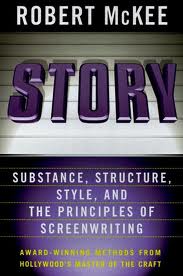
When I was writing my novel, I spent about 40 days in January and February on the first draft, writing for 2 hours or more a day. Then I edited and revised the whole thing again. Then I sent it off to 4 "friend editors" who had MFA's and grad school degrees in literature in March. Then I rewrote it again with their feedback in April. Then I raised enough money in May to send it to a professional book editor in June. In July, he sent me an incredible edit, along with some gentle but emphatic advice:
"Have you read Story, by Robert McKee?" he asked me. "If yes, revisit it. If not, check it out."
Yeah, yeah, I thought. I know how to write a story. But I checked it out. After all, I had just paid him $1200 to tell me things like this. And his other comments were so insightful, brutal, and wise that I figured I'd give this Story book a chance.

Boy, am I glad I did. The book is, as you can see, subtitled: "Substance, Structure, Style, and The Principles of Screenwriting," so it's not something most authors of fiction would go to first. But telling a story on the screen and telling a story in a book overlap quite a bit.
In the book McKee breaks down some of the most-loved and effective scenes in cinematic history. And he tells you why, in concise, anecdotal detail, how and why they work. That helped me look at my novel manuscript scene by scene and tweak what needed tweaking by adding or cutting. It made the pacing and focal points of my scenes much better.
But the big things was his opening chapter. McKee lays out 20 or so foundational things that make a story work. He drops one in italic bold, then spends a paragraph or two breaking it down. It was a huge help for me. Even though I had heard of or thought I knew most of what he was saying, when I was writing the novel, I got so deep into the trees of my own brain that it got hard to look at my book as a forest.
For example, McKee writes: "Your protagonist has to have something at stake for you to have a compelling story."
If you're like me, you read that and think, "Yeah, no kidding. I know that." You may know it, but did you do it? Is it obvoious and compelling to your reader in the same way it is to you in your own head? For me, the answer to this and other similar questions was usually somewhere between "no" and "kind of."
My point is, there is a big difference between writing something that is long enough to be called a novel, and writing something that is tight and compelling enough to do the job of a novel. This book drove that home for me and made my novel infinitely better in many little and foundational ways.
I highly recommend it.
Image source: Susan NYC via flickr

0 comments